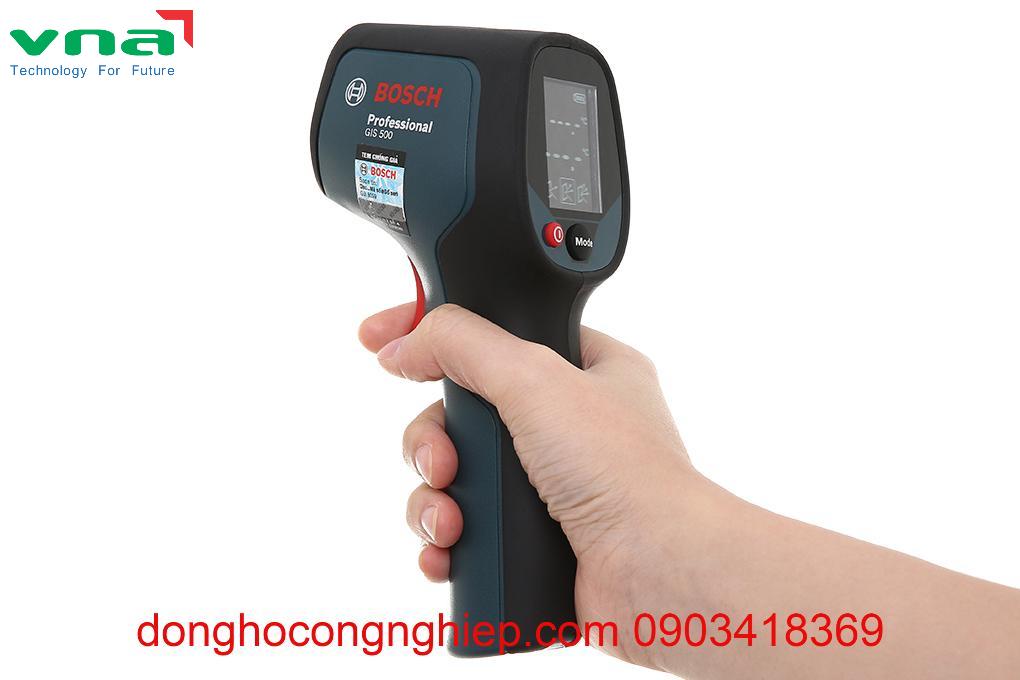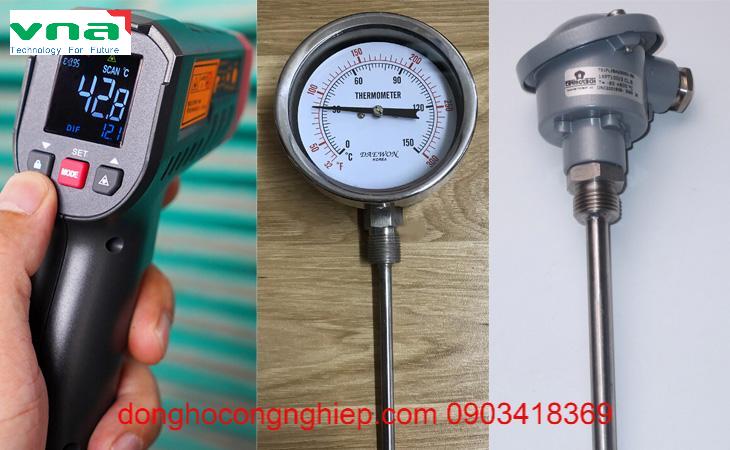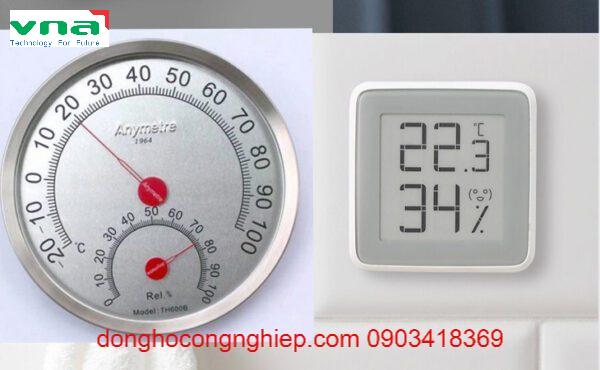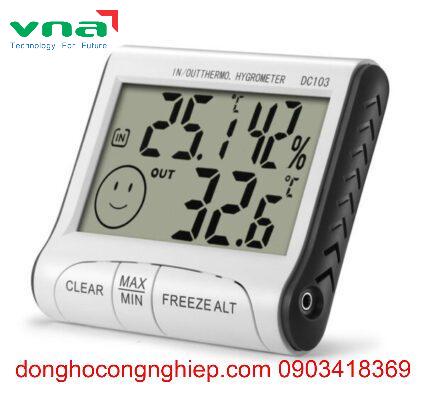Engineering Service
Industrial temperature and humidity meter
Industrial temperature and temperature meters support measuring the surface temperature of objects that are high up, far away, and hard to reach, to ensure optimal quality of equipment, machinery, and products. Let’s learn more about this device and its applications with Vnatech!
What is an industrial temperature meter?
Industrial temperature gauges are tools that help measure and control appropriate environmental temperatures, to ensure product quality meets standards and machinery and equipment operate effectively.
Industrial temperature and humidity meters are often used in factories, plants, and workshops thanks to their ability to give accurate temperature measurements in a short time with a wide temperature range, ranging from -100 to 1400 degrees Celsius.

What type of industrial temperature and humidity meter is usually?
Industrial temperature gauges are also quite diverse, you can find the following types on the market:
- Industrial temperature gun: Has the same design as an infrared electronic thermometer, compact size makes it easy for users to hold when operating. In addition, the case material has strong impact resistance. Industrial temperature guns can measure from -50 to 400 degrees Celsius.
Industrial temperature meter: Also known as industrial thermometer. The top of the tool is designed with a round face, inside there is a temperature indicator needle. The bottom part of the tool is a fixed temperature probe or a wire type that can be plugged into the position where the temperature needs to be measured. The measuring temperature range of this instrument ranges from -170 to 500 degrees Celsius. - Industrial temperature sensor: Capable of measuring temperature over a wide range, often used with a temperature converter that supports reading signals from the temperature sensor.
Operating principle of industrial temperature and humidity meter
In industry, there are many types of devices used to measure temperature and humidity. Below are some operating principles of some popular temperature and humidity measuring devices in the industry:
Temperature sensor:
- Thermistor sensor (RTD): The RTD sensor uses the effect of changing the resistance of a thermally conductive material (usually platinum) with temperature. When the temperature increases, the sensor’s resistance also increases, and vice versa. This resistance is measured to determine the temperature.
- Thermocouple: Thermocouple sensors use the Seebeck effect, in which the temperature difference between the two ends of a pair of different materials creates an electric potential. This potential is measured to determine the temperature.
Humidity sensor:
- Capacitive sensor: Capacitive sensor uses the change in capacity of a capacitive electrode based on the humidity of the environment. When humidity increases, the capacity of the capacitive electrode also increases, and vice versa. This change is measured to determine moisture content.
- Resistive sensor: Resistive sensor uses a material that absorbs or releases water based on the humidity of the environment. The change in resistance of this material is measured to determine moisture content.
Applications of industrial temperature and humidity meters

Through the above information, you can see that industrial temperature gauges are essential equipment in today’s industries, production, and exploitation. Such as:
- In agriculture: Support farmers in checking the moisture content of different types of seeds, agricultural product storage areas, and machinery used for production.
- In industry: Support workers to control and maintain temperature during product processing, thereby ensuring output product quality. Furthermore, industrial temperature measuring machines also help industries control and control machinery to operate effectively.
- In meteorology: Supports researchers in monitoring the average temperature and humidity of a specific geographical location.
Why is it necessary to use an industrial temperature and humidity meter?
Using industrial temperature and humidity meters brings many important benefits. Here are some reasons why it is necessary to use temperature and humidity meters in industry:
- Production process control: Temperature and humidity play an important role in the production process. Using temperature and humidity meters helps control and adjust these parameters to ensure the production process operates stably and achieves the desired product quality.
- Ensuring safety and protection: In industries such as chemical, pharmaceutical and food, temperature and humidity can affect the safety and protection of workers and products. Using temperature and humidity monitors helps ensure that working and storage conditions meet safety and protection standards.
- Adjust and calibrate equipment: Temperature and humidity meters are used to adjust and calibrate other equipment in industrial processes. For example, temperature gauges are used to adjust and calibrate a temperature control system, ensuring that it operates accurately and reliably.
- Monitoring and data recording: Temperature and humidity meters provide continuous monitoring and data recording of temperature and humidity in industrial processes. This enables early detection of unwanted and potentially harmful changes to processes and products.
- Compliance with regulations and standards: In many industries, there are strict regulations and standards regarding temperature and humidity. Using a temperature and humidity meter helps ensure compliance with these regulations and standards, avoiding legal violations and unwanted incidents.
Criteria for choosing the most suitable thermometer and hygrometer
Currently, the market has many types of temperature and humidity measuring devices. Each form will serve different user needs. There are self-recording thermometers and hygrometers for indoor and outdoor measurements, in factories, warehouses, etc.
Choose for yourself a standard temperature and humidity meter that works well. First of all, you need to note the following important criteria:

Check the technical specifications
This will help you choose the right machine model for the environment in which you need to use it. A few parameters you need to consider when choosing a thermometer and hygrometer are:
- Limit the temperature and humidity of the measuring environment.
- The scope of activities is wider or narrower. Devices with a wide measuring range will help make measurements more accurate.
- The smaller the scale division, the more accurate the measurement.
Check for machine errors
The technical tolerance design of each humidity and temperature meter will have its own requirements. Good temperature and humidity measuring devices will have an error of +/-5% (for indoor environments). For environments requiring higher accuracy, the error should be 1%.
Learn about the features of temperature and humidity machines
A standard self-recording thermometer and hygrometer will have to integrate basic features such as:
- Has auto-record mode, auto-save to memory
- Ability to calculate average value automatically
- Able to measure other environmental parameters such as CO2 concentration, CO, dust…
Equipment versatility
Think about whether you should choose a machine with a handheld design or a fixed installation to measure in separate areas. Choose corded or cordless. Depending on system requirements, flexibility in measurement usage or environmental factors. From there, consider choosing the product that best suits you!
Choose to buy at reputable addresses
No matter what equipment you buy, you must choose genuine products, fully certified with CO, CQ, and technical test tables. The temperature and humidity meter you choose must be tested for accuracy by authorities.
And most importantly, you must choose to buy from reputable establishments with a commitment to quality and a flexible return warranty. Vnatech is currently a genuine distributor of quality, highly effective, and affordable measuring equipment for the majority of users.
Communications
VIETNAM TECHNOLOGY DEVELOPMENT AND TRANSFER JOINT STOCK COMPANY.
Office: VT09-BT02 – Xa La Urban Area – Ha Dong – Hanoi.
Tax code: 01 05 158 192
Home page: www.vnatech.com.vn
Website: http://donghocongnghiep.com/
Email: contact@vnatech.com.vn


